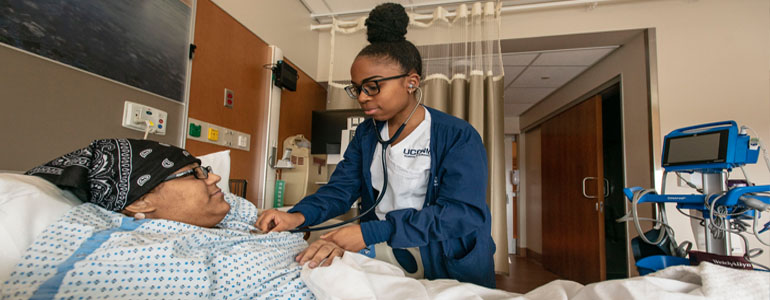
WHAT IS NURSING?
This major is part of the Health and Medicine Exploration Group
Nurses are leaders and innovators of healthcare who consistently strive to improve the quality and outcomes of care. They are patient advocates who practice and provide care for individuals across the lifespan who may represent culturally diverse backgrounds and lives. The patients may be an individual, a family or a community. On any given day, you can find nurses caring for others in public and community health settings, acute and chronic care facilities. Nurses work collaboratively with other healthcare team members to provide high quality and safe patient-centered care across the lifespan. For example, a nurse caring for a patient experiencing abdominal pain will ask a series of direct questions about the symptoms to learn the possible cause of the pain. The nurse alerts a healthcare provider, such as an Advanced Practice Nurse or physician, and they work together to order tests and begin treatment. A public health nurse might work with local towns to educate and screen for lead exposure in young children and organize vaccination clinics to protect the community from infectious diseases. A nurse working in an outpatient infusion center administers chemotherapy medication to a patient who lives alone and has difficulty driving to the center. The nurse may consult with a social worker about resources to support transportation to and from the appointments. In a home care setting, a nurse performs a physical assessment on an elderly patient with heart disease and consults with a physician, pharmacist, physical therapist and home health aide on a plan of care. Another nurse cares for a patient who is in labor and requires continuous monitoring to facilitate a safe delivery. These are only a few examples of the different types of patients and environments in which a nurse can work.
If you study nursing, you may provide care in any of these health care settings to educate and enhance the lives of patients every day. You will learn about assessing, planning, implementing and evaluating care for patients, families, and communities. Nursing majors are also educated to promote the health and well-being of people from culturally diverse backgrounds and lives.
The School of Nursing offers two pre-licensure programs: a traditional 4-year baccalaureate program and an accelerated 2nd degree post baccalaureate program, Certificate Entry into Nursing/B.S. (CEIN/B.S.). The traditional undergraduate program provides an opportunity to combine a general education with professional preparation in nursing. This curriculum requires four academic years. The post baccalaureate program, CEIN/B.S., is a one-year program designed for individuals with baccalaureate degrees in other areas. Both programs are accredited by the Commission on Collegiate Nursing Education and approved by the Connecticut State Board of Nurse Examiners.
Declaration, Major Requirements, and Courses
HOW TO DECLARE:
APPLICATION. Admission is extremely competitive and typically requires at least a 3.5 GPA. The application deadline is typically early February. Application instructions can be found here.
---
MAJOR REQUIREMENTS:
---
HELPFUL INTRO COURSES:
Click here for full course descriptions. Both NURS courses below are only open to nursing students.
CHEM 1122 - Chemical Principles and Applications OR CHEM 1127Q - General Chemistry 1 (Major Requirement)
BIOL 1107 - Principles of Biology 1 (Major Requirement)
PSYC 1100 - General Psychology 1 (Major Requirement)
NURS 1130 - Health Care Delivery System (Major Requirement)
NURS 1131 - Introduction to the Discipline of Nursing (Major Requirement)
